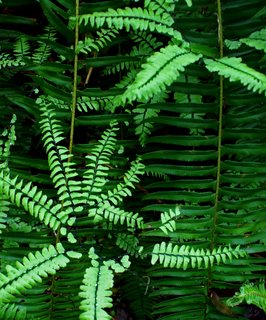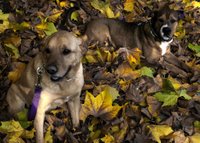
5/30/06 7 miles
Memorial Day weekend. I had planned three days of camping and hiking in the Olympics, however weather seemed to interfere with most of those plans. We got to camp in Heart-of-the-Hills campground which I hadn't slept in since I was a young child dreaming of a life in the mountains. That experience brought back a flood of memories, mostly warm and cozy in a very damp forest. And we did get to hike a bit on Saturday, probably the best day that we had. As the snow was still hanging on in the upper regions and had hindered our planned hike, we opted for one of the river hikes - namely the Elwha.
I had been on this trail a year earlier with another friend, but because of limited time we only hiked the Geyser Valley loop. An enjoyable hike, but since we were also training for our trip along the wonderland later in the summer, I was hoping for more distance. Our plan was to go up the river as far as we could, turning back when weather or fatigue forced us.
Spring growth covered the forest floor; fresh new green of ferns, vanilla leaf, vine maples and berries. We walked through this vibrant green world when we heard the first of the distinctive sound that gave Geyser Valley it's name - grouse call. In the near past during the early explorations of the Olympic Peninsula, explorers and trappers heard the distinctive whoop, whoop, whoop of grouse, combined with the swirling mists from the river chasms led these adventurous men to mistakenly believe that geysers lay in the valley. And while we walked through these hushed woods we were accompanied by grouse.
We soon came across Michael's cabin, built by an early settler who made his way in the woods serving the locals by hunting cougars and later became a respite for travellers through the Olympics. A little further up the valley we detoured to see Humes Ranch, another early settler. A deer quietly grazed in the meadow in front of the cabin - I spotted her but a young family on the trail missed her until Michael pointed her out for them. The deer continued to graze oblivious to her observers. By this time the sun had come out to warm up the valley, sunlight glinting of the moist vegetation, and we were faced with a decision. We could continue along the Geyser Valley loop, head back to the main trail an follow it up as far as we wanted along the Elwha, or take a branch over across the river and towards Dodger Point. We had been warned by the rangers that the upper elevations of Dodger Point were still snow-covered, but we decided to head that way anyway and turn back when we needed to.
The rivers in the Olympics can be extremely temperamental and the Elwha is no exception. We crossed areas of landslides where the river had eroded the hillside below and took the rest of the hillside with it leaving behind soft loose earth that gives uncertainty to your footsteps. We reached the bridge across the river at the base of the Grand Canyon of the Elwha and sat for lunch on the other side. The only other living thing we saw during lunch was a spider weaving a web between the leaves of a huckleberry bush.
The trail to Dodger Point had not yet been cleaned up from the winter blow-downs and we needed to cross several trees stretched across the our path. But we weren't in a hurry and weren't concerned with time lost. At some point we decided it was time to head back home and retraced our steps back to the trailhead. As the afternoon slipped by clouds came back in to cover the valley and we were greeted by falling mist as we returned to camp.



